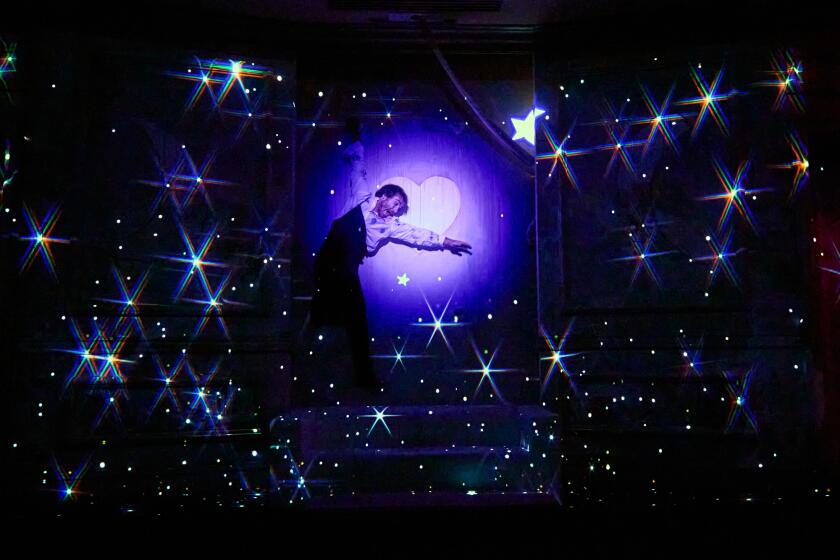Tchaikovsky’s Greatest Hits Revisited
It was in a spirit of dutifulness, with lashings of guilt, rather than enthusiasm that this reviewer approached a recently released Tchaikovsky package including the Fifth Symphony.
In truth, it was a more attention-grabbing edition of the Fifth than the half-hundred ignored by this column in the past decade, documentation of a live Tchaikovsky concert presented at the 1963 Vienna Festival by the London Symphony under its then-88-year-old music director, Pierre Monteux.
The program, which the uncredited engineers captured in clean, spacious sound and with minimal audience intrusion, also includes the First Piano Concerto, with soloist John Ogdon, and “Romeo and Juliet” (Vanguard 8031/32, two mid-priced CDs). The master tapes were, according to the accompanying notes, “misfiled . . . and only lately rediscovered in mint condition,” under what circumstances we are not told.
The LSO’s playing is magnificent, the strings mellow without thickness and, where necessary, astringent; the solo winds warmly vibrant; the brass responding not only with the requisite forcefulness but also with a bracingly edgy clarity.
Monteux, never one to sugarcoat schmaltz, is a cleareyed but hardly dispassionate interpreter, serving up a performance that has pace (excepting a too-cautious statement of the finale’s march the last time around), shape and intensity--and an overall warmth and structural integrity that bespeak profoundest communication between conductor and orchestra.
After the refreshing delights of the Monteux-LSO Fifth (the Concerto and “Romeo” will be attended to another time), this listener approached a trio of CD editions of the Tchaikovsky Fourth, likewise studiously avoided for years.
The three: one led by another 88-year-old, Leopold Stokowski--a reissue of his 1971 recording with his American Symphony (Vanguard 8012, mid-price); a new release from Gennady Rozhdestvensky heading the orchestra once known as the USSR Ministry of Culture Symphony, which recently visited us as the macaronically named State Symphonic Kapelle of Moscow (Erato 45620, with “Romeo and Juliet”), and a revisionist view of the subject by master demystifier Christoph von Dohnanyi and the Vienna Philharmonic (London 425 792, with the “1812” Overture).
Stokowski, never known for slavish textual fidelity, is at his most destructively self-willed here. The opening motto theme is stated with thrilling, black-toned heft. What follows shouldn’t even happen to the worst music, what with the conductor’s ceaseless imposition of form-destroying tempo changes and arbitrary dynamics. It doesn’t get any better later, only slower, sloppier and more contemptuous of the composer’s wishes.
The neatness of Dohnanyi’s reading, the coolly accurate playing of his orchestra and London’s hyper-clear sonics generate admiration for Tchaikovsky’s technical skill but provide little clue as to what made the Fourth Symphony’s creation a necessity for this most emotional of composers.
While Rozhdestvensky is clearly attracted to Tchaikovsky’s emotionalism, he is not blinded by it to the point of forsaking balance, textural clarity and continuity.
The Russian conductor and his responsive orchestra, with its dark, plush strings and thick-toned solo winds, give us the full dose of the opening movement’s tragic hysteria, an elegantly songful slow movement and a pizzicato-scherzo delivered with point and faintly sinister wit.
While the finale may lack the sense of ferocious, cathartic release felt in the celebrated 1960 Mravinsky-Leningrad Philharmonic recording (Deutsche Grammophon 419 745, with Symphonies 5 and 6), the two performances are worthy of being mentioned in the same breath.
With this much emotional indulgence already expended, why not go all the way to the Sixth Symphony, the “Pathetique,” the most emotional of them all?
Again, the listening experience proved not only painless but downright refreshing by means of an ancient 1930 recording from an old master of the idiom, Serge Koussevitzky, and his longtime partners, the Boston Symphony.
This 1930 document, part of RCA’s valuable mid-priced Legendary Performers series (60920, with “Romeo and Juliet”), sings, sighs and exults with the very best of them, but it never descends to empty histrionics. And the old-timey plushness of the BSO strings--emerging with striking presence through the residual surface noise of the 78s used for this transfer--remains balm to the ears.
More to Read
The biggest entertainment stories
Get our big stories about Hollywood, film, television, music, arts, culture and more right in your inbox as soon as they publish.
You may occasionally receive promotional content from the Los Angeles Times.






